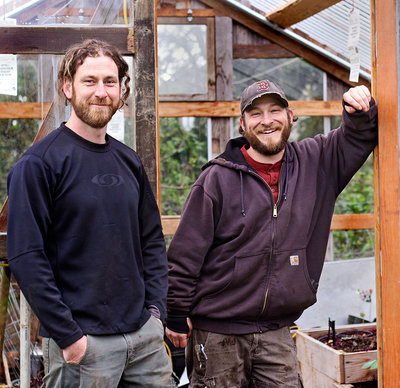
“Until last August, this was disused horse pasture.” Forest Weaver, Sean Ferrigno and I are standing at one end of a rectangular field. It’s mostly rough grass, but snaking mounds of soil wind over the mid-section, ready for planting. One is already planted with blueberries, and nearby are grape vines and some young fruit trees. A former client of Weaver’s (he was in the construction business) offered him the use of this land as a base for Garden Starters, the business Weaver and Ferrigno founded last year to help individuals and organizations convert underutilized land into a productive source of food.
The heart of this young venture is at the far end of the field: an impressive composting set-up contained by repurposed boards. As we head over there, Weaver and Ferrigno describe their operation, which uses almost entirely recycled and reclaimed materials. “We are composting predominately horse manure from a local stable and surplus herbs that we get from Mountain Rose Organics, who produce several palettes of the material every week,” Weaver says. I ran my fingers through some dry, ground-up nettles in use as a mulch nearby. Amazing, fragrant, pleasant stuff. The compost bins are made out of recycled cedar fencing and corrugated galvanized panels. Ferrigno says, “The only thing we buy new are the screws!”
“We monitor temperature in the bins and aim for 140 degrees to kill off pathogens.” The finished compost is mixed with 10 percent of its volume of worm castings (produced by a 20-foot-long worm farm right next to the compost bins) to make the soil they supply to their customers. The soil is also on sale, bagged, at Backyard Farmer, and they use the same soil to grow vegetables on site. The land’s owner, who lives here and already had a small productive food garden on the property, suggested increasing the cultivated area four-fold to produce food for people in need. As a result, and expecting a surplus, Weaver and Ferrigno hope to introduce a small CSA this summer.
Even though the field sits on good, silty loam typical of its location, the Garden Starters are using a no-till version of hugelkultur, a kind of lasagna gardening that incorporates tree branches and other wood waste under a mound of soil. The rotting wood retains moisture that is available to plants. Here they simply pile the branches directly on the ground after knocking back the grass, and top with their own soil.
Garden Starters is entirely organic. They charge for time and materials, but advice is free. “Our main interest is to increase the amount of high quality, healthy food that’s being grown in the area. We aim to get people who are not used to gardening really excited about it, and by providing the materials and building raised beds, we get people off to a fast start that first year. We can provide labor for people who need it, but we mostly want people growing their own food themselves.”
When I first learned about Garden Starters, I asked Weaver if it was a for-profit version of Victory Gardens for All, the organization started by Charlotte Anthony some years back. “It’s funny you would mention Victory Gardens,” he responded. “I first got the idea for Garden Starters after Charlotte and I worked on my neighbor’s garden several years ago. There are a few things that set us apart from most other organizations of this type,” he continued. “One of those things is we make our own products that can be purchased any time of year, like our organic soil amendments and worm castings, wooden raised beds and composting systems. Also, our customers are able to have the peace of mind from knowing that all the work we do is done under landscaping and construction licenses.” Ferrigno has 13 years of landscaping experience.
“Recycling materials is a big draw. Part of our mission is to reduce waste. Customers like the idea, and we can provide them with a cheaper deal than if they were buying new. We also care very much about our community and the people who live in it. We are planning a garden giveaway contest for some local businesses that are focused on helping people.” And on April 26, Garden Starters will hold a sale at 90 N. Lawrence St. in Eugene to benefit the School Garden Project, offering plant starts, raised beds and soil.
“Sean and I started this business with almost no start-up capital, using grassroots advertising,” Weaver says. “We hope to grow in the next few years to be able to serve all of the Eugene area and help our neighbors get out in the yard and grow food.”